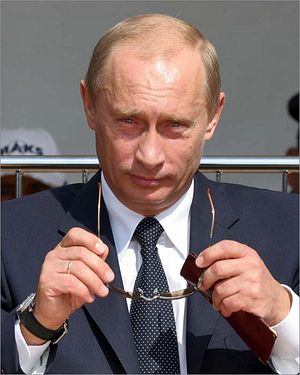“I have come here on behalf of all the people of the United States to express our deep gratitude for all that you gave and all that you lost to defeat the forces of fascism.” Twenty years ago, U.S. President Bill Clinton pronounced those words in Moscow on the 50th anniversary of the surrender of Nazi Germany to Soviet forces on May 9, 1945.
At the time, Russia was fighting a brutal war – then in Chechnya – and Western leaders, including Clinton, did not attend the military parade in order to send a message to Russian President Boris Yeltsin. But Clinton, along with the British prime minister, French president, and German chancellor, all attended a parade of World War II veterans through Red Square, and they were all present afterwards at a reception in the main Kremlin palace. As Clinton emphasized then, he had chosen to visit Moscow for the occasion to honor the sacrifices of the Russian people, not as a favor to the Russian president.
Today we are faced with an even more difficult situation in which Russia has seized the territory of another sovereign country, and the reluctance of Western leaders to allow President Vladimir Putin to have his shining moment in the sun on the 70th anniversary of Victory Day is understandable. Putin will almost certainly use the occasion, as he has many times in the past, to paint Russia as the world’s heroic bastion of resistance against the forces of world domination. He will likely associate the United States and its European allies, obliquely or directly, with Nazi Germany in that context.
U.S. President Barack Obama, French President François Hollande, German Chancellor Merkel, and Polish President Bronislaw Komorowski have chosen not to attend the Victory Day celebrations as a consequence. It is very difficult to imagine Obama attending, largely for reason of domestic American politics. With the presidential election of 2016 already beginning to dominate the American media and political landscape, neither he, even as a post-midterm second term president, nor the Democratic Party, want the images of him standing next to Putin on Red Square as Russian soldiers march by to be broadcast on CNN or Fox News. The last thing he and his party need, especially as he prepares to fight with Congress on a proposed nuclear deal with Iran, is another reason to be portrayed as soft on America’s adversaries in the international arena. However, Merkel and Komorowski are not in the same situation, and their non-attendance is a mistake.
It is a mistake because, as President Clinton emphasized 20 years ago, Victory Day is about more than our current relationship with the man in charge in the Kremlin. As high as Putin’s poll numbers are at the moment, there are those in Russia who are concerned about what Russia’s current confrontational stance vis-à-vis the West is doing to Russia’s standing in the world, as well as its economic future. Even those Russians that harbor hesitations about Putin’s policies, however, see Victory Day, and the incredible sacrifices it represents, as sacrosanct, and they are unlikely to view the decision by Western leaders to boycott this important celebration as an understandable outcome of the conflict in Ukraine. Putin has consistently fed his people the line that the new government in Kiev is dominated by fascists, and that Russia is fighting the same anti-fascist war that it did 70 years ago. Not having the German chancellor and Polish president there at Victory Day will make this line of argument a lot more credible.
There are many audiences in which the political and rhetorical battle between the West and Russia is being fought out at the moment, and one of them is the Russian people. It would make it much more difficult for Putin to talk about the West as fascists if Merkel were standing right next to him. She would also no doubt give her own speech, which would allow her to present her version of history, and its relevance for contemporary politics, directly to the Russian people. We should try to show the Russian people that we are not out to get them, that the analogy between the West today and the fascists of the 1930s and 1940s is false, and that we understand the historical context of Russia’s relationship with the West.
We should certainly not accede to Russia’s seizure of Crimea and continuing aggression against Ukraine, and punitive measures are in order, but the optics and symbolism of this particular measure are self-sabotaging. There is a difference between demonstrating to the Russians that actions have consequences, and seemingly allowing those actions to erase history, thereby cementing the narrative in the minds of many Russians that this is about the West trying to destroy Russia, rather than the West standing up for Ukraine. Sooner or later, we are going to have to talk with the Russians, and recalling the time when we stood together might help establish that rapport that we are going to need.
Jeremy Friedman is the Associate Director of the Brady-Johnson Program in Grand Strategy at Yale University, and he will be joining the faculty of Harvard Business School this fall. His first book, “Shadow Cold War: The Sino-Soviet Competition for the Third World,” will be published by the University of North Carolina Press in September.

































